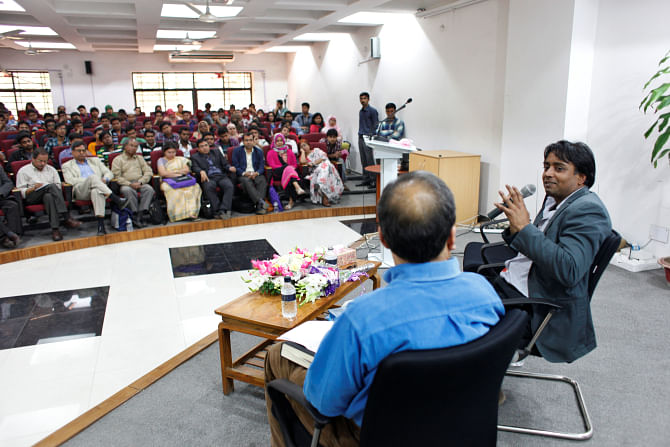Bangladesh land of dead ideas
Bangladesh land of dead ideas
Zia Haider Rahman tells DU talk

Bangladesh is a land of dead ideas, where new concepts are throttled at birth and never get passed on because of social, political and class barriers, Zia Haider Rahman, the author of critically acclaimed novel "In the Light of What We Know", observed yesterday.
"This country belongs to people with extraordinary power and privileges," he said, referring to how ideas mostly come from the top and people on the bottom rung of the ladder always say "yes" to those.
The British-Bangladeshi writer was speaking at a talk titled "Notes of a Native Son", organised by Dhaka University's English department in Muzaffar Ahmed Auditorium of the social sciences faculty. Haider, who came to Dhaka last month to attend the Hay Festival, was also critical of the dominance of Bangladeshi politics by two ladies who according to him "stand in the shadow of the dead" and rely on their dead relatives to legitimise their moral authority to rule the country.
Ideas need to be resurrected from the dead and people have to find ways to stop imposition of political and other forms of restraint on freedom of speech, he said.
Haider shared anecdotes of how he failed to properly communicate with colleagues at TIB, staff at Sonargaon Hotel, and even with the Hay organisers in Dhaka.
Comparing the country's present situation with that in 2002 when he worked at the Transparency International Bangladesh (TIB), he said the country had become more dangerous.
In a reply, he said he did not see light in Bangladesh's picture and that it was going to be very hard for the younger generation to bring reform.
Haider also read out from his debut novel, and said his publishers would bring out a low price edition for some South Asian countries and that he planned to publish a Bangla translation.
While replying to Prof Fakrul Alam of the English department about the presence of the 1971 Liberation War in his novel, the author said many in the West including young Bangladeshis in London did not know about the war though it was a significant phenomenon.
"It is now the subject of political competition," he said, referring to the war.
Chair of the English department Prof Tahmina Ahmed presided over the programme.